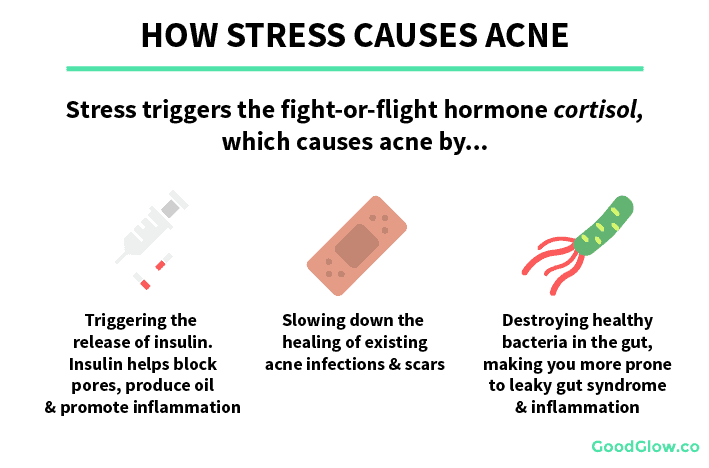Acne comes in a variety of forms. One type of acne is hormonal acne, which is caused by imbalances caused by factors such as stress.
This type of acne is most common when our bodies are constantly stressed. Like other types of acne, stress acne is caused by oily skin, bacteria, and inflammation.
Like other types of acne, stress acne can be treated both naturally and with medication or a change of lifestyle.
Today, we will go over stress acne in detail, why stress causes acne, and how you can treat it at home.
5 Reasons Stress Causes Acne
Check out this graphic summarizing the ins and outs of stress causing acne:

1: Elevated Cortisol Level
Acne and stress are linked in a downward spiral. Acne causes stress, and stress causes acne. It’s remarkably tricky to break the cycle once it has started.
When we are stressed, our bodies push out an excessive amount of cortisol, increasing glucose production while inhibiting insulin function; excess glucose is harmful to the skin.
Furthermore, cortisol hormones stimulate the skin’s sebaceous glands, causing it to produce more oil. Excess oil clogs the pores on the face. This, in turn, causes skin inflammation.
Stress acne is caused by inflammation, oil, and clogged pores. All of this occurs as a result of the body’s elevated cortisol levels during times of stress.
2: Disrupted Hormones
Stress is a striking donor to sparse health. A stressed-out individual will never be perfectly healthy. Stress causes a variety of changes in our bodies, one of which is altered hormones.
Our bodies do not function properly when we are stressed. It may increase or decrease the production of various hormones because each hormone functions differently.
Some hormones work to increase insulin production, while others work to increase oil production on our faces.
This change in our body’s normal system harms our overall health. This also has an impact on the skin on our faces. Those with sensitive skin are the most affected.
3: Slow Healing of Acne
Acne lesions are no less serious than skin wounds. The wound takes time to heal, and scars take even longer to fade.
To recover properly, we require adequate rest, care, and nourishment. When people are stressed, they do not take care of their skin, and if they already have acne, it worsens.
According to research, when a person is stressed, wound healing, including acne, slows down.
Because acne heals more slowly, pimples remain on your skin for longer periods, making you more prone to acne.
Because the previous acne has not healed and more have formed, more acne will be visible on the face at the same time.
4: Stress Eating
Your enemy is your habit of stress eating. It not only causes you to gain weight but also has a negative impact on your skin.
This is something that stress eaters tend not to understand. When they are stressed, they do not count calories and eat whatever is in front of them.
Oily and junk food, in particular, are harmful to one’s health. Toxins will be added to our bodies due to eating unhealthy foods, and we will develop bad skin.
Second, eating oily foods will cause our skin to become oilier.
As previously discussed, oily skin provides a breeding ground for bacteria that cause acne. This is how stress causes overeating, which causes acne on your face.
5: You Stop Taking Care of Your Skin
The first thing a depressed person does is fail to take proper care of themselves. We dislike getting dressed and taking care of our appearance because of anxiety and depression.
However, we do not need to overlook the importance of self-care, which provides a sense of happiness and well-being.
We should cleanse our faces properly at least twice a day, and exfoliate once a week.
However, stress causes us to feel ill, and we abandon our skincare routine, which must be followed regularly.
Our skin collects dust and bacteria that cause skin damage. It becomes a habit not to care for our skin after a period of prolonged stress, which aggravates acne.
3 Types of People Most Prone to Stress Acne
1: Those Who Stay Stressed/Depressed
Those who are frequently stressed are more prone to stress acne than those who keep their nerves under control. We all encounter stress at some period in our lives.
Some people are better at hiding their emotions than others. They not only hide them from others, but they also learn to live with it over time.
They never let stress interfere with their way of life. On the other hand, some people allow stress to take control of their lives.
These individuals start to eat unhealthy foods and stay up late at night. A combination of these factors causes acne.
2: Those Who Have a History of Acne
A person with a history of acne is more likely to develop stress acne. It makes no difference if they had hormonal acne previously; simply having acne can make you more prone to pimples.
Once the skin has developed bacterial growth and clogged pores, it can take months to years to remove them altogether.
There is constantly the chance of developing it again and again, even in later stages of life. Their skin becomes extremely sensitive to minor triggers.
When they are stressed, they are more likely to develop acne than those who have never had acne on their face. As a result, if you have a history of acne, exercise caution on stressful days.
3: Those Who Do Not Take Care of Their Skin
Skincare should be an essential part of your daily routine. Typically, you should wash your face with an excellent hydrating face wash.
If you have very oily skin, you should utilize an oil-free face wash. Pat the skin dry before applying a toner and moisturizer, which should be repeated at night.
It’s recommended that you use a natural face mask and exfoliate your skin at least once a week. Oil, as well as dead skin cells on the face, can clog the pores, promptly resulting in acne.
3 Ways To Relieve Stress-Induced Acne
1: Meditate

First, you must identify and eliminate the source of your stress acne.
It makes no difference how many natural remedies and medical treatments you try for stress acne; it will pop back up under stressful conditions.
This is why you should make an effort to relax your mind. Once you discover how to manage your emotions, you will be less stressed and have less acne on your face.
Mindfulness techniques can keep you mentally calm and emotionally fulfilled. Your concentration and attention span will improve.
As a side benefit, your attention will not be diverted to unneeded stress. Make it a habit and keep at it. Start with 10 minutes every day and work your way up from there.
2: Medical Treatments
There are two medical treatments available for stress acne. First, you should learn to manage your stress efficiently. You should seek the advice of a psychiatrist for this purpose.
They may offer some counseling sessions followed by medication to calm your nerves because It’s important to tackle the underlying cause of your acne.
Then you should see a dermatologist who will help you in recovering from skin blemishes and breakouts. A dermatologist will typically recommend three to five sessions for acne treatment.
After the acne has cleared up, various techniques such as dermabrasion and laser are used to remove acne scars.
Laser and dermabrasion both have pros and cons. The treatments are somewhat expensive, and not everyone can afford them.
3: Diet

Improving your diet is the simplest and safest way to combat stress acne. Including healthy foods in your daily diet will help you achieve a smooth, acne-free complexion.
Above all else, choose fruits. They are high in vitamins. Bananas, for example, are a mood booster. Bananas will make you satisfied and less stressed.
These fruits will keep your face clean and healthy, lowering your chances of developing acne. Additionally, drinking water is a healthy option.
It eradicates toxins from the body and purifies your face’s pores. Eating vegetables will also give you a sense of well-being.
You will feel more relaxed and energetic if you eat healthy foods. This will reduce the likelihood of experiencing stress anxiety.
Takeaway
The worst type of acne is stress acne. Our daily routine can cause us to feel a variety of emotions. We feel happy and stressed at different times.
It’s nearly impossible not to be stressed, but things worsen when you start getting acne due to stress.
Stress disrupts our sleep cycle and hormonal levels, resulting in excessive oil production and acne formation. Meditation can assist you in dealing with stress.
A healthy lifestyle, such as drinking more water and eating fruits and vegetables, can allow the development of smooth skin.

